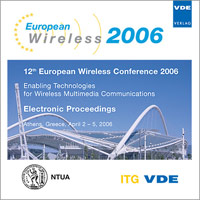Improved Performance of Quasi-orthogonal Space-time Block Code over Time-selective Channels
Konferenz: European Wireless 2006 - 12th European Wireless Conference 2006 - Enabling Technologies for Wireless Multimedia Communications
02.04.2006 - 05.04.2006 in Athens, Greece
Tagungsband: European Wireless 2006
Seiten: 5Sprache: EnglischTyp: PDF
Persönliche VDE-Mitglieder erhalten auf diesen Artikel 10% Rabatt
Autoren:
Wang, Youxiang; Jin, Jiyu; Park, Yongwan (Department of Information & Communication Engineering, Yeungnam University, Korea)
Inhalt:
-Quasi-orthogonal space-time block code (QO-STBC) can provide full rate transmission and partial diversity under low decoding complexity. Previous work on QO-STBC assumes that channel is flat or remains static over the length of the codeword. However, time-selective channels do exist, and in this case, the detector proposed in H. Jafarkhani, “A quasi-orthogonal space-time block code” can not be used to achieve a proper error performance. In order to mitigate the severe performance degradation, the zero forcing (ZF) equalizer and the minimum mean square error (MMSE) equalizer are employed in this paper. Meanwhile we also propose a zero forcing interference cancellation decision feedback equalizer (ZF-IC-DFE) and a minimum meansquare error interference cancellation decision feedback equalizer (MMSE-IC-DFE) via Cholesky factorization of Gram matrix of the channel after performing interference cancellation. By feeding back past decisions on already detected symbols, DFE schemes can achieve an additional performance gain compared to their corresponding linear equalizers.


